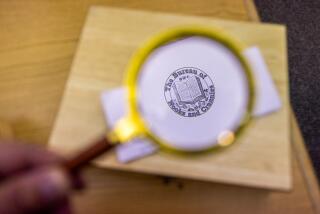PERSPECTIVE ON LIBRARIES : A Gate Leading Beyond the Barrios : Todayâs reopening rekindles remembrances and highlights budget cutsâ effect on another generation.
We are products of the Los Angeles Public Library system. One of us is a film and television director. The other is a broadcast journalist. We each have a half a ton of what we call âawards hardwareâ on our mantels. But our biggest and most basic achievement is that we survived what today is becoming an increasingly difficult task: growing up in the barrio. We eluded the gangs, the dope dealers, the dead-ends. Weâre not in prison or a cemetery plot.
We were reflecting on this because of todayâs grand reopening of the downtown Central Library. Like thousands of other Angelenos, we plan to be there for the ribbon-cutting festivities.
The downtown library in particular, and the L.A. city library system in general, were pivotal to our personal evolution. It was where we polished our thinking, probing, questioning, imagining. It was where we began the eye-opening process of knowing more about the world beyond the barrio.
It was there that one of us was first transfixed by Steinbeck, Chandler and Poe. It was there that the other was first transported to the brave new worlds of Asimov, Bradbury and Heinlein. It was in the library that new worlds of words and ideas were opened to us--a couple of scruffy kids from L.A.âs Eastside.
So we celebrate the reopening of the downtown library, that grand dame. But at the same time, we lament the fact that so many Chicanitos and other kids from our old neighborhood and from throughout Los Angeles donât have the same chance to be seduced by the wonders of words and the nuance of metaphors that we discovered at the public library.
Thanks to the huge budget cutbacks, shortened hours, shutdowns and other sinister steps that are plaguing todayâs libraries, kids wonât have the accessibility to books and challenges and discoveries that we had when we made our daily visits to the Lincoln Heights branch in the late 1950s, or our constant marathon expeditions to the Central Library in the â60s.
We lived at the library.
After school and even on the weekends, we were there. Doing homework, exploring the new people and places that beckoned to us in books or just walking among the stacks being awed by the overwhelming weight of the books and the ideas they contained.
Now letâs be clear about something. We werenât prissy, cloistered bookworms. We played ball, got dirty and broke a window or two. But itâs no exaggeration to say that for us and lots of other kids on the Eastside, the library was the portal through which we saw visions of better worlds and glimpses of ways we could improve our own.
The library made a huge and lasting difference in our lives.
Thatâs why it was such a shock for us during the last week of April, 1986, when the libraryâs innards were consumed by fire. Seeing the Central Library after it became a blast furnace of books was a difficult and unforgettable experience. Each of us was there shortly after the fire.
For Torres, who covered the fire as a reporter for KNX Radio that day, the encounter brought back memories of reading about Lou Gehrig and Satchel Paige on the second floor, surrounded by the magnificent WPA murals.
For Trevino, who recorded the desperate process of loading books to be âfreeze driedâ for a PBS documentary the day after the fire, walking through the stacks was an eerie form of deja vu. He had worked in these stacks all through high school.
Like lots of other folks in Los Angeles, weâve done our tiny parts to help the library restoration. A check here. A fund-raiser attended there. And while itâs great that the newly refurbished (and expanded) Central Library will open up, weâre still aguitados about the sorry state to which we, the people of Los Angeles, have allowed our public library system to deteriorate.
Last springâs riots remind us of what can happen when our young people donât have alternatives to gangs and drugs. Those kids who want the alternative the library represents are now being denied access.
If the neighborhood library branch isnât boarded up, its doors are only open at the oddest times--something like the third Tuesday of the month between 11:39 a.m. and 3:57 p.m., unless, of course, there is a partial eclipse of the sun. Itâs almost that bad.
We know that the library made a crucial difference in our lives. While we welcome the reopening of the Central Library, we wonder how many potential filmmakers, journalists, doctors, scientists and teachers will be lost when new generations of barrio youngsters find the doors of their neighborhood libraries closed because of the budget cutbacks.
More to Read
Sign up for Essential California
The most important California stories and recommendations in your inbox every morning.
You may occasionally receive promotional content from the Los Angeles Times.










